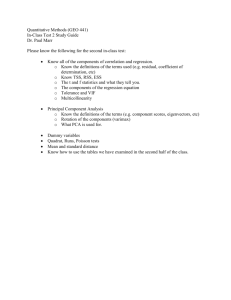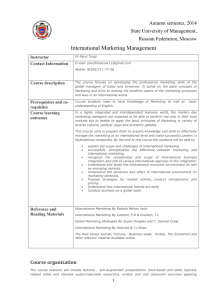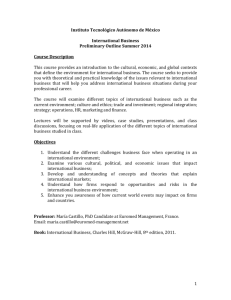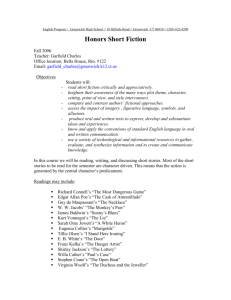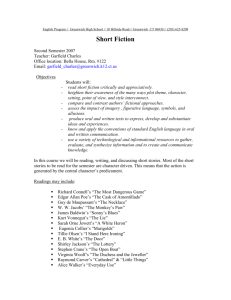SENECA COLLEGE OF APPLIED ARTS AND
advertisement
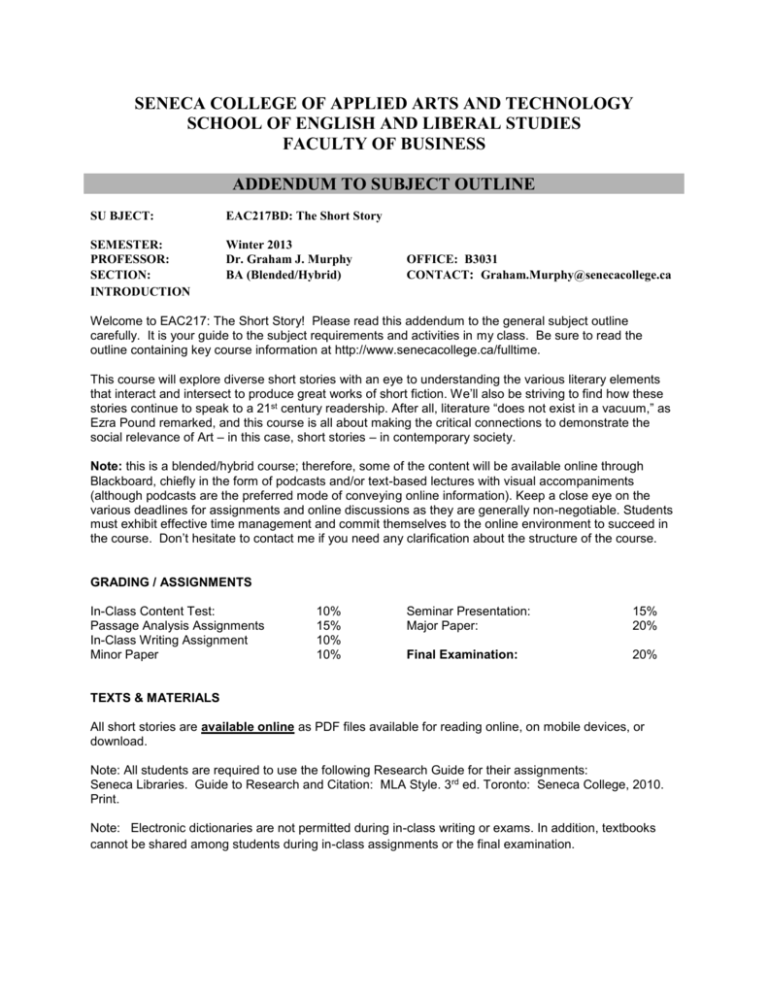
SENECA COLLEGE OF APPLIED ARTS AND TECHNOLOGY SCHOOL OF ENGLISH AND LIBERAL STUDIES FACULTY OF BUSINESS ADDENDUM TO SUBJECT OUTLINE SU BJECT: EAC217BD: The Short Story SEMESTER: PROFESSOR: SECTION: INTRODUCTION Winter 2013 Dr. Graham J. Murphy BA (Blended/Hybrid) OFFICE: B3031 CONTACT: Graham.Murphy@senecacollege.ca Welcome to EAC217: The Short Story! Please read this addendum to the general subject outline carefully. It is your guide to the subject requirements and activities in my class. Be sure to read the outline containing key course information at http://www.senecacollege.ca/fulltime. This course will explore diverse short stories with an eye to understanding the various literary elements that interact and intersect to produce great works of short fiction. We’ll also be striving to find how these stories continue to speak to a 21st century readership. After all, literature “does not exist in a vacuum,” as Ezra Pound remarked, and this course is all about making the critical connections to demonstrate the social relevance of Art – in this case, short stories – in contemporary society. Note: this is a blended/hybrid course; therefore, some of the content will be available online through Blackboard, chiefly in the form of podcasts and/or text-based lectures with visual accompaniments (although podcasts are the preferred mode of conveying online information). Keep a close eye on the various deadlines for assignments and online discussions as they are generally non-negotiable. Students must exhibit effective time management and commit themselves to the online environment to succeed in the course. Don’t hesitate to contact me if you need any clarification about the structure of the course. GRADING / ASSIGNMENTS In-Class Content Test: Passage Analysis Assignments In-Class Writing Assignment Minor Paper 10% 15% 10% 10% Seminar Presentation: Major Paper: 15% 20% Final Examination: 20% TEXTS & MATERIALS All short stories are available online as PDF files available for reading online, on mobile devices, or download. Note: All students are required to use the following Research Guide for their assignments: Seneca Libraries. Guide to Research and Citation: MLA Style. 3rd ed. Toronto: Seneca College, 2010. Print. Note: Electronic dictionaries are not permitted during in-class writing or exams. In addition, textbooks cannot be shared among students during in-class assignments or the final examination. TENTATIVE WEEKLY SCHEDULE DATE 1 2 3 4 Jan. 7 (in-class) Jan. 10 (online) Jan. 14 (in-class) Jan. 17 (online) Jan. 21 (in-class) Jan. 24 (online) 6 Jan. 28 (in-class) Jan. 31 (online) Feb. 4 (in-class) Feb. 7 (online) Feb. 11 (in-class) 7 Feb. 14 (online) Feb. 18: Family Day 5 8 Feb. 21: Minor Paper Due (10%) Mar. 4 (in-class) Seminar Presentations: “Train from Rhodesia,” “His First Ball,” and “On the Road” “Book of Harlem” Mar. 3: Passage Analysis Option #3 Due (see assignment for details) Mar. 11 (in-class) Mar. 18 (in-class) Mar. 21 (online) 11 Mar. 25 (in-class) Mar. 28 (online) 12 13 Introduction Purchase book; course overview Introduction cont’d: Review website Elements of the Short Story: “The Doctor’s Heroism” “The Flowers” Jan. 20: Passage Analysis Option “I Spy” and “Cathedral” #1 Due Online “American Dreams” (see assignment for details) Jan. 28: In-Class Writing Assignment (10%) “The Loons” “The Cask of Amontillado” and “The Tell-Tale Heart” “A Habit of Waste” Feb. 10: Passage Analysis #2 “The Tell-Tale Heart” and “The Test” Sign Up Sheet for Seminar Presentations Option Due (see assignment for Now Available!!!! details) “Borders” Family Day Holiday: No Class Miscellaneous Content (as required) STUDY WEEK: Feb. 25 – Mar. 1 Mar. 14 (online) 10 TASKS Feb. 21 (online) Mar. 7 (online) 9 READINGS Apr. 1 (in-class) Apr. 4 (online) Apr. 8 (in-class) Apr. 11 (online) Apr. 15 Exam Week Starts Seminar Presentations: “Wants,” “Story for the Slicks,” and “When It Changed” “The Yellow Wall-paper” Study for Content Test Content Test Review Seminar Presentations: “The Monkey’s Paw” and “A Rose for Emily” Mar. 18: In-class Content Test (10%) “Mr. Truepenny’s Book Emporium and Gallery” Mar. 21: Major Paper Due Date #1 (20%) Seminar Presentations: “The Drover’s Wife,” “The Snake,” and “The Immaculate Conception Photography Gallery” “Greasy Lake” Mar. 28: Major Paper Due Date #2 (20%) Seminar Presentations: “Mr. Andrews,” “A Clean, Well-Lighted Place,” and “Chaos, Disorder, and the Late Show” “Miss Brill” Start studying for examination Examination Review Exam date and location to be announced Due dates at a glance Jan. 20: Passage Analysis Option Due Jan. 28: In-Class Writing Assignment (10%) Feb. 10: Passage Analysis Option Due Feb. 21: Minor Paper (10%) Mar. 3: Passage Analysis Option Due Mar. 18: In-Class Content Test Mar 21: Major Paper Due Date #1 (20%) Mar 28: Major Paper Due Date #2 (20%) CORE LITERACIES AND LEARNING OUTCOMES As per Seneca College’s commitment to Core Literacies embodied in key critical skills (Communication, Numeracy, Critical Thinking & Problem Solving, Information Management, Interpersonal, and Personal), the graduate of EAC217: The Short Story has reliably demonstrated the ability to: 1. communicate clearly, concisely and correctly in the written, spoken, and visual form that fulfills the purpose and meets the needs of the audience (Communication) 2. respond to written, spoken, or visual messages in a manner that ensures effective communication (Communication) 3. locate, select, organize, and document information using the appropriate technology and information systems (Information Management) 4. analyze, evaluate, and apply relevant information from a variety of sources (Information Management) 5. show respect for the diverse opinions, values, belief systems, and contributions of others (Interpersonal) 6. interact with others in groups or teams in ways that contribute to effective working relationships and the achievement of goals (Interpersonal) 7. manage the use of time and other resources to complete projects (Personal) 8. take responsibility for one’s own actions, decisions, and consequences (Personal) PROMOTION POLICY Successful completion of term work is a prerequisite for writing the final exam. Your professor will allow you to write the exam for practices purposes. EVALUATION OF WORK Evaluation is based on correct language usage, organization, and mastery of the subject at a post secondary level. Students are expected to learn professional standards of performance in the subject areas, and tests and assignments will be graded on that basis. In recognition of the significance of exceptional communication skills in the workplace, marks are deducted for language errors on all tests and exams. A student can be failed on the basis of language errors alone. MISSED TESTS / PRESENTATIONS / IN-CLASS ASSIGNMENTS Students who miss scheduled tests, presentations, or in-class assignments will receive a grade of zero. If there are valid reasons for missing the test, presentation or in-class assignment, the student MUST: a) Contact the professor or student advisor either by phone or by email prior to the start time of the test, presentation or in-class assignment; and, b) Next class, present the professor with a signed, word-processed memo indicating why the test, presentation, or in-class assignment was missed, with documentation where appropriate. At the professor’s discretion, a make-up test/in-class assignment or new date for the presentation may be granted or the value of the test may be added to a subsequent test or final exam. In courses where the grading scheme does not include the lowest test mark, this missed test policy does not apply. LATE ASSIGNMENTS Late assignments will result in a penalty of 5% per day to a maximum of five consecutive days. Assignments will not be accepted after five consecutive days or as otherwise indicated by your professor. If there are valid reasons for the late assignment the student MUST: a) contact the professor, either by phone or email, no later than the date the assignment is due to indicate the assignment will be late; and, b) present the professor with a signed, word-processed memo indicating why the assignment was late, with documentation where appropriate. If the reasons are deemed to be valid, there will be no penalty. ATTENDANCE AND PARTICIPATION Consistent attendance is important for success in this subject. If you are absent from class, please notify me by phone or e-mail. You are still responsible for the material and assignments missed and may be required to provide documentation. For extensions or special considerations, make the request to me well in advance of any due dates. Considerate classroom conduct, adequate class preparation, and constructive participation will enhance your academic experience and that of your colleagues. In particular, you are asked to be prompt, courteous, responsible, and collaborative. STUDENT / FACULTY CONSULTATION OUTSIDE CLASSROOM HOURS: My consultation hours are on Mondays or Thursdays. Please contact me in advance and we can arrange a meeting that is mutually beneficial; otherwise, e-mail correspondence is an effective way of reaching me. LEARNING CENTRE The Learning Centre offers academic support to all Seneca students in the form of one-on-one tutoring, small group tutoring, and workshops and are located in the libraries of the Newnham, Markham, York, and King campuses. Students should book tutoring appointments by either logging on to the Web Access Booking system (WABS) at https://www.senecac.on.ca/wabs/ or by visiting The Learning Centre in person. DROPPING A SUBJECT There are two deadlines for dropping this subject. If you drop by Day 10 of the semester, the subject will not appear on your transcript. If you drop by the last drop date (see Student handbook), the subject will appear on your transcript with a grade of DNC. To drop, please notify your professor, complete a “Timetable Change Form,” and return it to Registration by the deadline. Discuss any possible negative consequences of dropping the subject with the Coordinator. ACADEMIC REGULATIONS It is your responsibility as a student of Seneca College to be aware of and abide by the academic and behavioural policies outlined in the College Academic Policy and the Student Handbook. Here are some key policies: ACADEMIC HONESTY (Section 9 and Appendix E – Academic Policy) To continue to graduate high quality students and to sustain our reputation as a leading institution, Seneca must have the highest standards of academic honesty. Academic honesty means that all Seneca College persons will conduct themselves in an honest and trustworthy manner in all aspects of their academic career.Engaging in any form of academic dishonesty to obtain any type of academic advantage or credit is an offence and will not be tolerated by the College. The penalty for a first offence is a grade “0” on the work in which the offence occurred, and will result in a comment being placed on the student’s transcript. The penalty for the second offence is an “F” in the course where the offence occurred, a second comment on the transcript, and immediate suspension from the college normally for a minimum of three semesters. For more information about what constitutes academic dishonesty and how to avoid it, go to the following website: http://www.senecac.on.ca/library/Academic_Honesty/index.html STUDENT APPEALS (Section 12 – Seneca College Academic Policy) Students have the right to appeal academic decisions of the College. The procedures for informal and formal appeals are outlined in Academic Policy. If a student disagrees with the evaluation of an assignment or with a final grade, s/he must first discuss the matter with the professorin an attempt to resolve the matter informally. If the matter is not resolved, the student should discuss the problem with the Student Advisor or the Chair. Students must keep all assignments (including drafts and outlines) and exercises until they receive their final grade. No appeal will be considered unless a completefile is submitted at the time of the appeal. COPYRIGHT Copyright means the sole right to produce, reproduce, and copy work in which copyright subsists. This includes books, articles, textbooks, and other original creative works such as photographs, text, graphics, images, sound video, and games from the Internet. It is illegal to reproduce and/or distribute copyrighted materials without the express written permission of the author. Copyright information is available at http://www.senecac.on.ca/policies/copyright.html INFORMATION TECHNOLOGY ACCEPTABLE USE Official College e-mail is available to all employees and students. Faculty, staff, and students are required to use College-provided e-mail when corresponding electronically about College-related matters. For further information regarding the IT acceptable use policy, please refer to:http://www.senecac.on.ca/policies/itau.html DISCRIMINATION AND HARASSMENT All students and employees have the right to study and work in an environment that is free from discrimination and/or harassment. It is the policy of Seneca College that all employees and students have a right to work and study in an environment that asserts the personal worth and dignity of each individual. In order to achieve this objective, Seneca College will not tolerate any form of discrimination and/or harassment in its employment, education, accommodation, or business policies dealings. Information and assistance are available from the Resolution, Equity and Diversity Centre. For further information please see: http://www.senecac.on.ca/equity ACCOMMODATION FOR STUDENTS WITH DISABILITIES AND SPECIAL NEEDS The college will provide reasonable accommodation for students with disabilities in order to promote academic success. If you require accommodation, contact the Counselling and Disabilities Services Office at ext. 2900 to initiate the process for documenting, assessing and implementing your individual accommodation needs. Approved by: ____________________________________ Claire Moane, Chair School of English and Liberal Studies


